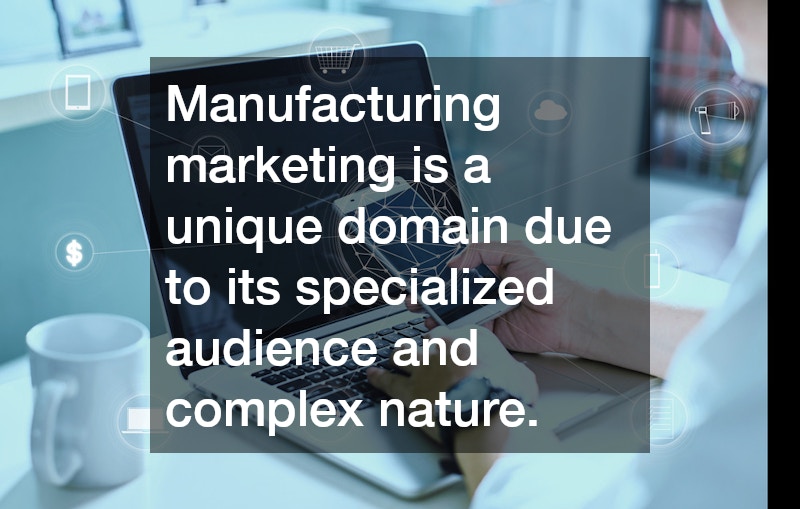Manufacturing marketing is a unique domain due to its specialized audience and complex nature. Unlike traditional consumer marketing, manufacturing marketing needs to focus on B2B relationships. Understanding the target audience is the first step for manufacturing marketing companies to develop successful campaigns.
The strategies employed often combine digital and offline methods like SEO, content marketing, trade shows, and direct sales efforts. As a result, the visibility and brand recognition can take longer to build compared to other industries.
Manufacturing marketing companies need to be persistent and adaptable in their strategies to match industry dynamics and client expectations.
Moreover, products in the manufacturing sector often have lengthy sales cycles. Clients usually take significant time to decide, given the cost and complexity of typical manufacturing solutions. In this light, manufacturing marketing must be prepared to nurture leads over extended periods, which affects how quickly results can be seen.
Factors Influencing the Speed of Results
One of the primary determinants of how quickly results manifest is the marketing budget. Larger budgets afford companies the opportunity to employ multiple tactics concurrently, from digital advertising to extensive content production. In contrast, smaller budgets may require a more focused and prolonged approach to yield visible results.
Another factor is the level of competition within the manufacturing sector. High competition can slow the process, as building a distinct online and offline presence takes time and effort. Hence, manufacturing marketing companies often conduct thorough competitor analysis to find opportunities for differentiation.
The initial setup and execution phase of digital strategies such as SEO and content marketing can also influence the time it takes to see results. These strategies are generally long-term, with SEO efforts often taking six months to a year to fully manifest. Nevertheless, once the groundwork is laid, these strategies can deliver long-lasting benefits.
Measuring and Accelerating Outcomes
Measuring the outcomes of a marketing strategy involves tracking various metrics, such as website traffic, lead generation, and conversion rates. Manufacturing marketing companies leverage sophisticated tools like Google Analytics and CRM software to gather this data. Regularly analyzing these metrics enables companies to assess the performance of their marketing efforts.
To accelerate outcomes, businesses can invest in targeted ads and promotional campaigns. While organic growth strategies are valuable for long-term success, paid advertisements can drive immediate traffic. Manufacturing marketing companies often recommend a balanced approach of both paid and organic strategies for optimal results.
Moreover, refining the value proposition and evidence of quality through customer testimonials and case studies can significantly enhance trust. This, in turn, facilitates a quicker conversion process. Effective marketing communication that emphasizes USPs and reliability is pivotal to achieving faster results.
Case Studies on Successful Manufacturing Marketing
Real-world examples provide great insights into how different strategies perform in practice. For instance, a manufacturing company that utilized a combination of SEO and targeted LinkedIn campaigns saw a noticeable increase in client inquiries within four months. These campaigns were carefully tailored to reach key decision-makers in the industry.
Another case involved a manufacturing firm that focused heavily on content marketing. By consistently publishing insightful whitepapers and engaging blog articles, they built authority and trust over a period of ten months. This approach resulted in a steady flow of qualified leads who were already primed for conversion.
Yet another example is of a company that adjusted its market positioning through rebranding and targeted email campaigns. This change in strategy led to a 50% increase in web traffic and a 30% rise in conversions within six months. These case studies highlight how personalized strategies by manufacturing marketing companies can yield substantial results.
Conclusion: Balancing Expectations with Strategy
While there is no one-size-fits-all timeline for achieving results in manufacturing marketing, understanding key influencing factors is critical. Companies need to set realistic expectations and be prepared for gradual progress, especially in a highly competitive field. Success often requires a combination of patience, precision, and persistent adaptation of marketing strategies.
Manufacturing marketing companies play a vital role in this process by crafting tailored strategies that align with business objectives and market conditions. They provide invaluable expertise in assessing market trends, competitor landscape, and consumer behavior. By leveraging their insights, manufacturing firms can better navigate the complexities of modern marketing.
Ultimately, maintaining a long-term vision while adapting to changes can pave the way for sustainable marketing success. The commitment to understanding and addressing customer needs will expedite the realization of marketing goals. A strategic blend of innovation and consistency is key to thriving in the manufacturing marketing sector.
.


